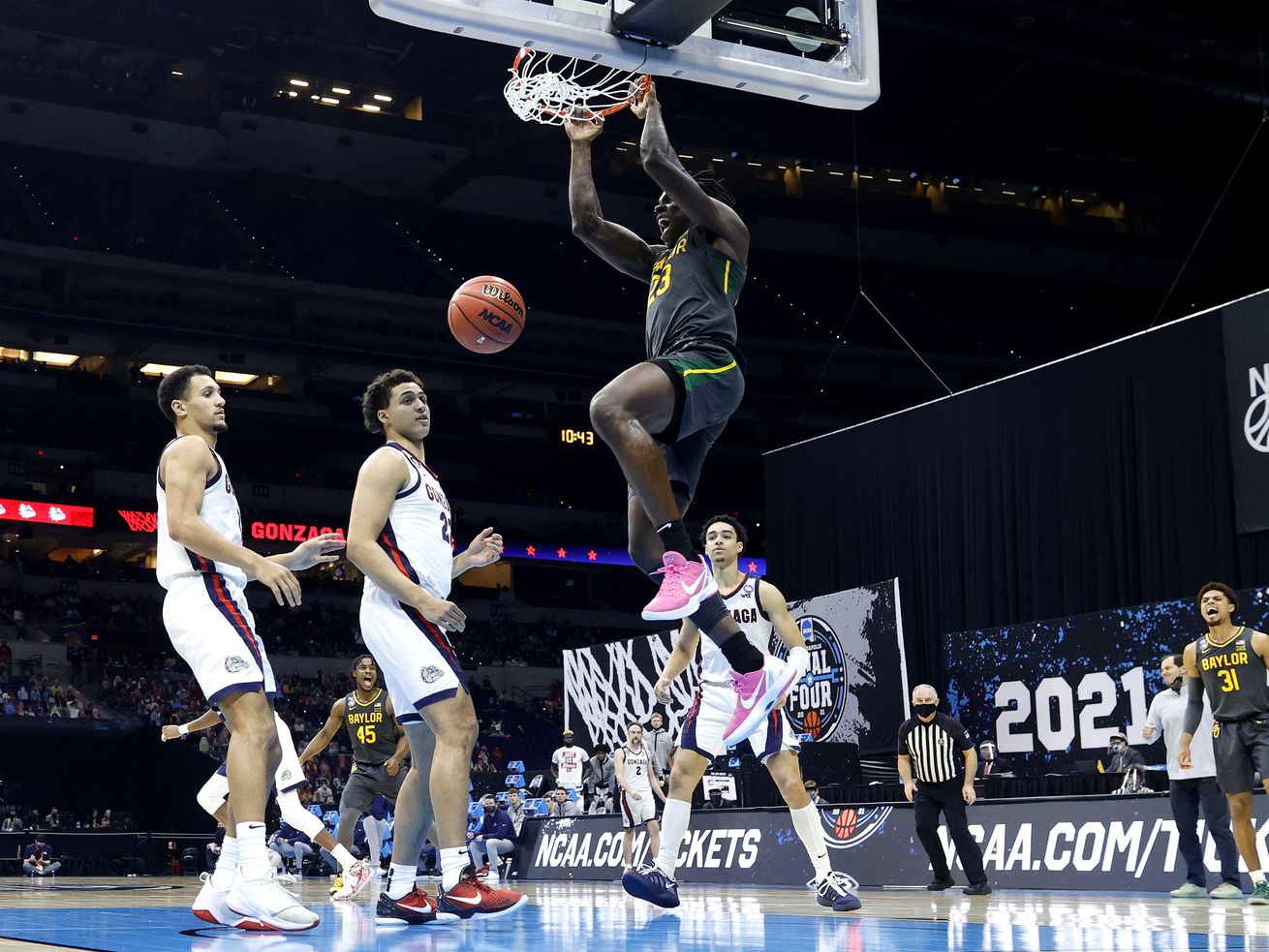
The sport had its dream final Monday with Baylor-Gonzaga, but the NCAA’s days of corruption and exploitation soon might be coming to an end.
College basketball was never about Joe College and roo-rah and diligent, fresh-faced cagers in letter sweaters with textbooks under their arms.
That’s the “Leave It to Beaver’’/Disney image, part of the raccoon-coat lore that delights us yet with its fantasy of virtue and innocence.
We’d just as soon forget the many scandals in the game, the inequities built into its structure. Remember, head coaches make millions of dollars each year, players nothing.
Got another American industry like that?
I’ll answer for you: No.
Gonzaga against Baylor was one of the great college championship matchups until the Baylor rout began. Storylines were terrific.
Gonzaga is the private little Catholic university (5,200 enrollment) in Spokane, Washington, that seems to exist for basketball runs. Clearly, that is not the case, but have you ever heard the school mentioned for anything other than the NCAA men’s tourney or as the birthing ground for John Stockton?
And Baylor. Oh, brother.
Another smallish, private, religiously affiliated school — Baptist, 16,000 enrollment — this one is in Waco, Texas, the heart of football country.
Waco might be most famous for being the home site of the reality TV show, “Fixer Upper,’’ as well as the former home of preacher David Koresh and his Branch Davidian compound that in 1993 was burned to the ground in a fire, killing 76 church members.
But Baylor men’s basketball itself has some nasty history tied to it, and its rebirth from the ashes is one of the great reversals in college hoops programs.
Back in 2003, a player on the team murdered a teammate and hid the body, and coach Dave Bliss basically tried to cover up the whole thing. The player ended up getting 35 years in prison for the murder, and Bliss — without question one of the scummiest college coaches ever, cited by the NCAA for his ‘‘despicable behavior’’ — was fired for a host of violations.
But guess what? Bliss went on to continue coaching elsewhere and was, indeed, coaching at a high school until the COVID plague hit last year.
There’s some of your college sweetness for you. But there’s so much more.
Like the game-fixing scandals in the 1950s that essentially undermined, to this day, the New York City college hoops scene. And there was the betting scandal at Boston College in 1979, part of the Henry Hill tale that became the genesis for the bloody mob movie “GoodFellas.’’ And the 1994 point-shaving scandal at Arizona State, featuring Stevin “Headache’’ Smith, point-shaver supreme.
Lowly Northwestern even got in on the stuff in the mid-1990s with a couple of point-shavers doing their thing and going to prison for their efforts.
We could go on. But the thing here is to remind folks that their wondrous entertainment, this college basketball playoff, with huge TV ratings, provided by students involved in ‘‘an extracurricular activity,’’ like they’re in the Latin club or float-building, is a charade that will, to some degree, be ending soon.
The dam simply can’t hold against the avalanche of player demands and basic unfairness of a product, overseen by millionaires but produced by ‘‘amateurs.’’ It has been building for 100 years, and the NCAA has done everything in its sneaky power to prevent athletes at the highest level from profiting from their work and images.
By next year sometime, players should have at least partial control of their images and subsequent revenue. The issue of image control is being debated in court, and if reason wins, player ownership will happen.
Already market experts are saying that, for instance, Jalen Suggs, the 19-year-old who made that incredible near-half-court shot to propel Gonzaga over UCLA and into the final, could be worth serious money himself, if he can market his image correctly.
Player movement is happening.
The one-and-dones who make a travesty of anything like college as an educational destination now have the G League to go to as well as high-paying gigs in Europe. When a simon-pure coach like Mike Krzyzewski and a respectable place like Duke take on a mercenary like Zion Williamson — the 2019 NBA Draft’s No. 1 overall pick who had zero interest in school and was, indeed, found to be ineligible because his mother accepted $400,000 from a marketing firm — well, the veil has been lifted.
Baylor has risen under coach Scott Drew, Gonzaga under coach Mark Few.
Just don’t forget what this is all about underneath: big-time entertainment and the money it produces.
